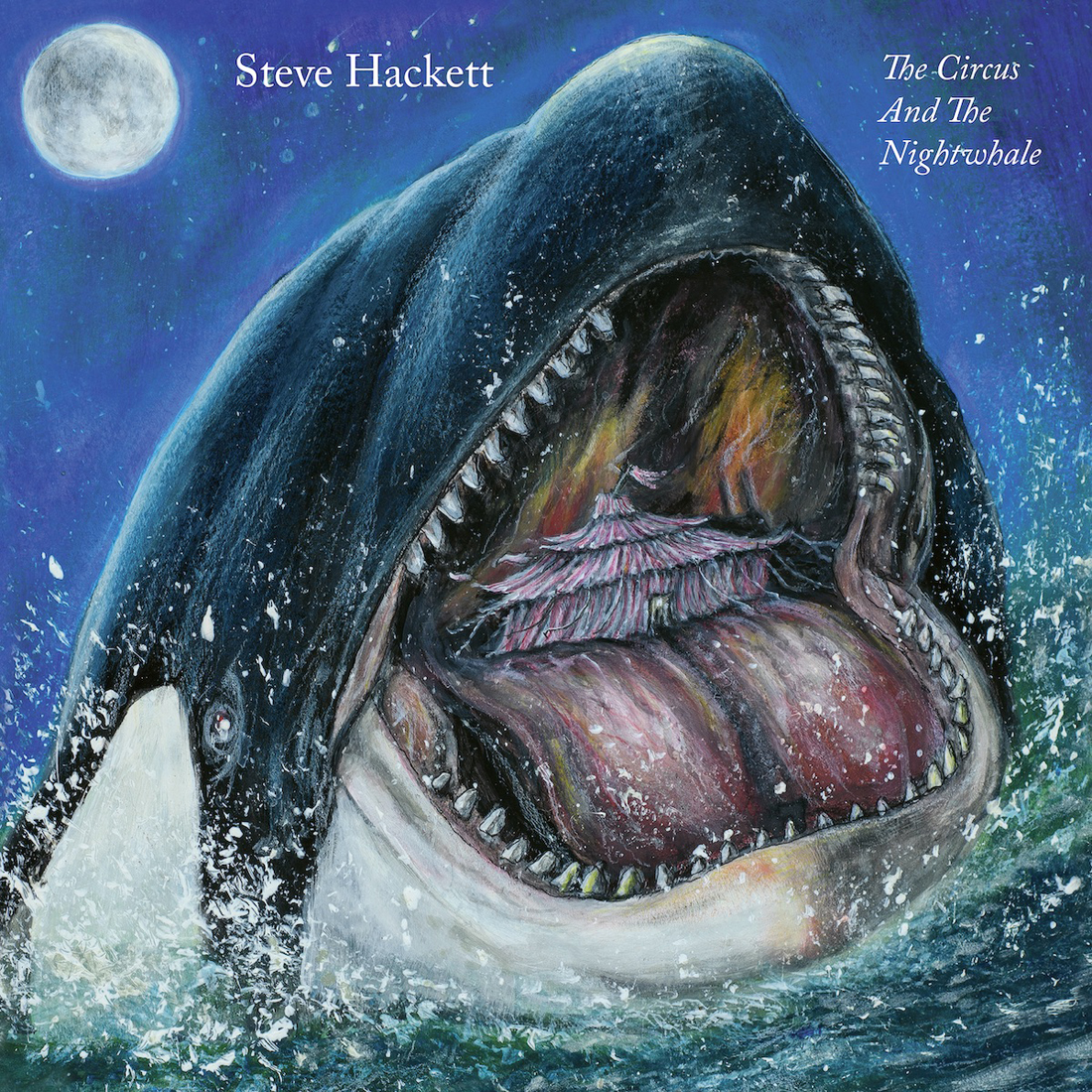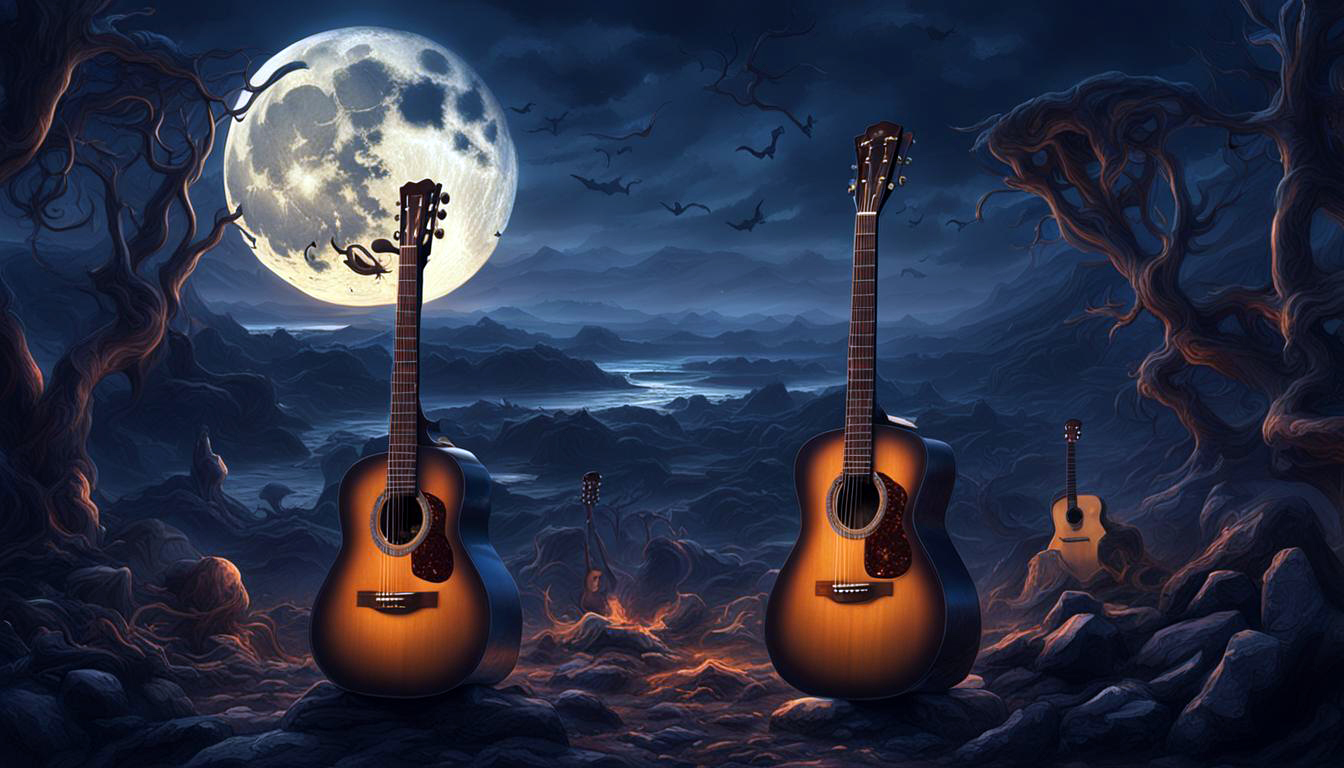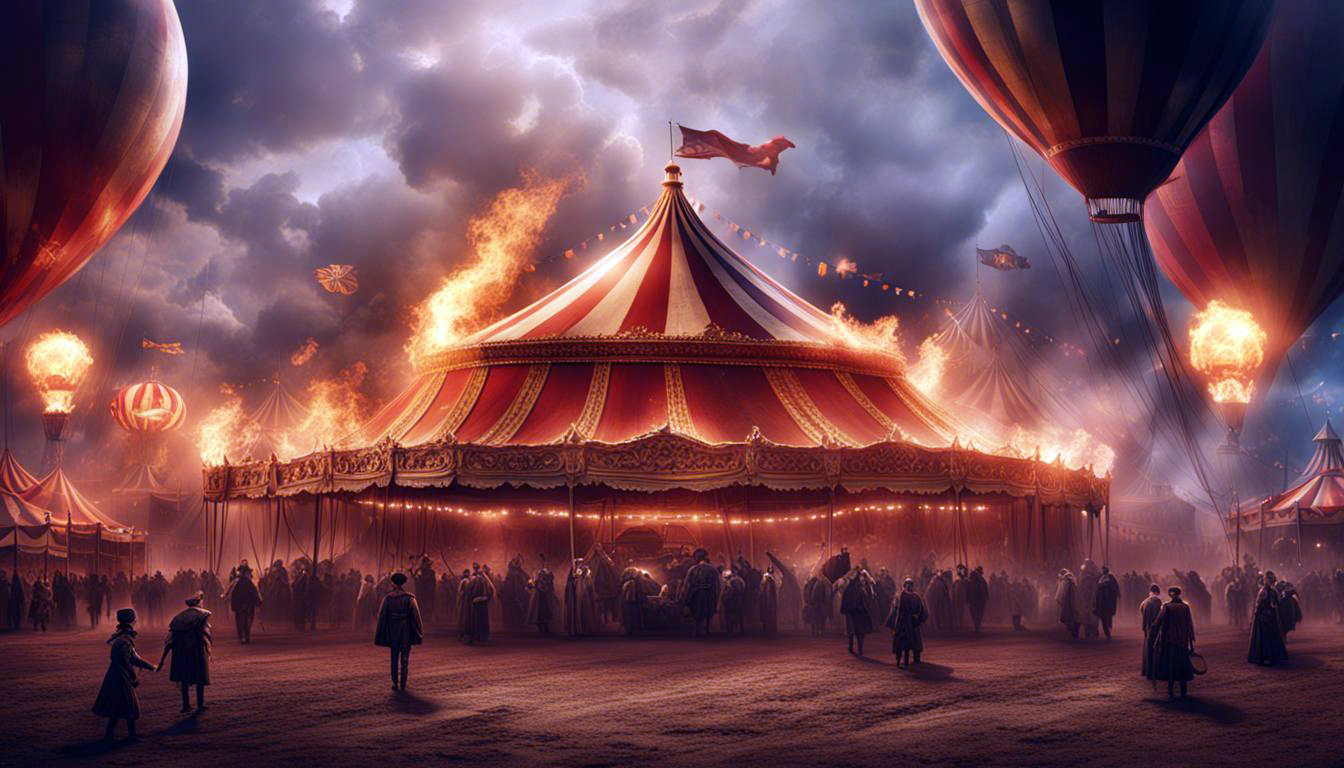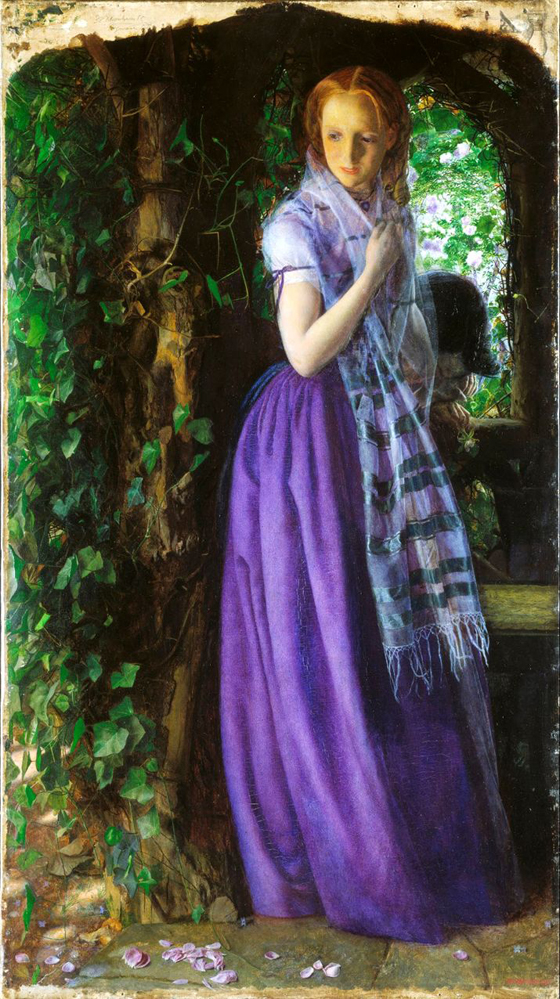Steve Hackett - Conjuring Pictures

by John A. Wilcox
Here we are in 2024! Steve Hackett has a brand new album called The Circus And The Nightwhale on the InsideOut label. It's an autobiographical concept album and one of his finest. On January 24th we chatted about the album. Here are the results! As an aside, other than the album cover, I created the art for this. I sent the logo piece to Steve as a birthday card. Read on...

PS: For me, The Circus And The Nightwhale stands as one of your finest albums to date!
SH: You know what? For me, I never know. I'm getting a very good reaction from everyone on this one and I don't understand what I've done right, to be honest. Because every album starts off with good intention.
PS: Of course!
SH: Somehow this one finds its niche or its mark. Funny, isn't it how it's working out like that?
PS: What's the phrase? Lightning in a bottle.
SH: Oh, well - lightning in a bottle - that's a good one! Yes! That's what we seek, isn't it? I think the difficulty for me is I'm probably doing my best stuff which should ideally be unleashed on a young audience. The audience I have are people approaching my own age. To be able to get a hold of a young mind such as mine was when I was listening to the marvels of what had happened to the Beatles during the mid period. I remember listening to I Am The Walrus thinking That's pretty marvelous! Who was that? and find out at the end of the tune yep, that was the Beatles. They completely re-invented themselves several times in song. To be able to reach a new audience would be great.
Unfortunately I've developed to this standard, if you like, quite late in my career. I've been a slow dog to do that. It's not something I could have done years and years ago, to be honest. I don't think I could have done that. I couldn't have played it. I couldn't have recorded it in this way. Production wouldn't have sounded like this. Technology. All of those things. I think what I have to accept is that it will appeal to the core audience and maybe it'll expand a bit. I don't know. We've got a video that seems to have gone viral - The People Of The Smoke. That seems to be taking off. 130,000 people watched that. Maybe 140,000 by now. People like it very much. And the 2nd single as well. People seem to like that as well. So 2 tracks have been released already. They're really tasters for the album. I don't like the term "singles" because I think singles - I don't think that there's any respect in creating a single. I think the things that you've got to go through in order to create a single - you've got to compromise greatly. Devote your whole being toward the all-singing, all-dancing single. I do think that that is an area available really to very young performers.
PS: You mentioned a word that definitely does not belong with this album, and that's compromise.
SH: Compromise, yeah.

PS: So let's dive into some of the songs. Let's start with Taking You Down.
SH: Lyrically it's about somebody that I knew when I was at school. Because the whole album is autobiographical. It's the year 1959 when we were both 9 years old. My friend had some kind of problem where he was in a wheelchair for a year or 2. I never really did find out what he had, but I used to push him around in the wheelchair. I volunteered to be his "man" if you know what I mean. We shared a lot of music. We shared a lot of things. He was quite an entrepreneur. He was a little bit like my first manager. He was a whole education in itself. He was a fantastic poker player already at the age of 9. So he teaches me how to play cards. How to smoke. I don't seem to remember drinking any alcohol but I think if he'd been able to get hold of that he would've as well. He was a whole sort of university of crime and other things. I was hobbled by conscience. The fatal flaw really within our relationship was that basically I think that he wanted to finish me off. That was really it. Then there was the idea that I really wasn't cool enough for him. And that I wore glasses. And that anytime I made an attempt to do anything hip, he would disparage it. The older we got the more I realized that we were adrift from each other. While I was still trying to make myself fit, he said well I can't go swimming anymore because I'm taking pills these days. That's what I do. I realized in the way that he had this sort of schadenfreuden aspect where anytime anything went wrong for me he absolutely delighted in it and I realized what this was leading up to was, y'know, if I'd just walked under a bus that would've been a great laugh for him.
It's about a sinister character and it's a very straight-ahead rock song. It's one of those slow, powerful things. I got Nad to sing it rather than myself. I did an early version and I didn't feel my voice was resonant enough in that key. It felt like it was more Nad's area. With the guitar work I've got 2 guitars with my whammy pedal. There are 2 octaves going. The low one's in there. And when I was doing the lead work at the early part of the song I was triggering an upper octave as well. I was sort of mixing that up. Jumping from - on the pedal you've got an octave down. So that's giving you a more rock solid thing. But then for the lead phrases I wanted to jump up higher so I'm triggering an upper octave so when I hit some of the high notes it's kind of screamy. It's an expanded guitar sound. It's a very straight ahead tune.
PS: I love the sax on it!
SH: The conversations I had with Rob with each of the tracks that sax appears on, I said Just full rant! Wild! Go for it! Nothing sacred! Nothing too melodic. Just having fun, basically. Delinquent playing.
PS: Let's move on to Enter The Ring.
SH: Enter The Ring was something that was done in a Genesis style. 12 string. Bass pedals. A little bit like the kind of stuff that we were doing, or almost did in 1971 when I was first working with them. The difference being today I can take an idea and develop it without sitting in a room with a bunch of other guys that are all hot to trot with the distraction of democracy. I didn't have to do that. I was able to dream with it. I was able to kick it around and write it with Jo. Write it with Roger. Take it to places. Let it go into time signatures. Allow it to become electric. Allow flute to appear and do something spectacular on it. There's harpsichord, 12 string, little delicate little tiny things. There's a thunderstorm that we recorded outside the window. And it works as a conduit to the track that follows - Get Me Out. It brings in basically fairground sounds. I wish I had a word for describing the sound of mechanical taking over from rock instruments. Having a programmed conduit into the next are where you feel like you're in an episode of The Prisoner. All of that malevolently mechanical area of things. Transitioning into rock instruments that take over from that in a similarly malevolent kind of way. Do a kind of dance of death, which is the track Get Me Out.
We are at the point of transition from teenage life into early 20s and in my case meeting and working with Genesis. Loving every minute of it but at the same time getting to a point where I realized I was being too heavily controlled in that situation and needing to expand my own writing. Recording my own material. Once that happened and it took off I was being accused of not giving the band everything and of course I countered with saying well, you know, the band isn't giving me cooperation to have any guarantee of the ideas I put forth getting done and I didn't want to have stillborn brainchildren. So I made a choice which was to leave Genesis and I think that Get Me Out really refers to that. The lyrics of Get Me Out. You can tell that there's a kind of malevolent energy that's driving it from the beginning and there's a lot to break out from. You can hear the anger in it. It is a sit-up-and-watch-this-space moment, I think. Get me out! Says a lot for anger and despair and the idea of I'll put you on my "I'll show you!" list.

PS: Ghost Moon And Living Love really hits me in a wonderful way. It's such a lovely piece!
SH: You're the 2nd person to have said this to me today and because it's a love song I basically always feel extremely vulnerable when it comes to love songs. For a start you've got to embrace the idea of singing a love song. They've got to have - the voice has got to work. I was being influenced by - well, there's 2 things. There's a band called Dare and the guy has a wonderful voice. A guy called Darren Wharton. They did an album in the early 2000s called Beneath The Shining Water, and I absolutely love this guy's voice. I was trying to come up with the kind of melody that he does and tried to sing in the way he does. A very kind of emotional vibrato. There's also Amanda Lehmann on it. The melody at the beginning with her celestial sounding voice, almost operatic, is something that I dreamt when I was recovering from swamp fever.
PS: Oh, yes! We talked about that last time!
SH: It was swamp fever that was cured by this melody. A healing melody and a healing sound. That's what characterizes much of that. And then there's the autobiographical aspect about my wife and I establishing ourselves as a permanent fixture. And the kind of ricocheting around that I was doing emotionally as it was dawning on me that I couldn't really live without her. She's crucial to me and I was the same for her. It was desperately important that we should be together full time. There was this whole other set-up that was going on. Really, I was being pulled in so many different directions. So that's some of the progeny of the song there.
PS: Tell me about Into The Nightwhale please.
SH: The circus really represents an aspect of being a professional musician. It's much the same as being in a circus. You give a nightly performance. You pack up and move on the following day. All of these things. The nightwhale represents a leap of faith toward the relationship I'm talking of and realizing that I was probably going to take a financial hammering in that situation I was gonna have to deal with with that. The downgrade financially. But I knew that I had to make that leap of faith in order to both be stronger myself and have this wonderful relationship that I have with Jo. As we are at the moment. She's contributed greatly to all of this. The title of the album actually came from her. She suggested it. The nightwhale was the idea of facing your darkest fear. The circus indeed on the cover gets swallowed by the nightwhale. Its mouth swallows it all up and I had to make that leap of faith.
It's a little bit like the Jonah story or the Pinocchio story where Pinocchio had to make that leap in order to become real. I think that's the subtext of that story. It's my personal equivalent. Someone was describing it and saying that the album was very dark. But this would be the album where at its darkest I was trying to create the idea of musical threat. Much of the instrumentation was using what I would call salvos. Fast runs, but using them as wash. Lots of tapping, but being done quietly in a sort of atmospheric unassuming sort of way rather than tapping in your face. There's tapping in your face as well. Just trying to use arpeggiated stuff. Or salvos. Just to create wash. Lots of notes and clusters. And I was doing it on electric rather than acoustic. Could've done it with acoustic. Roger was doing some very fast string work. The voice sounds were being manipulated to sound like wind. Which I think was very clever of him. He pulled together that whole track. I rather like that. I think it's possibly the album at its most Floydian, if you know what I mean. I think it's Floyd meets Crimson meets me meets all sorts of stuff!
PS: To me there's a 2nd theme to the album : Perseverance.
SH: Oh, perhaps.

PS: In your youth you endure a sociopathic friend. Genesis give you a bit of space to write and express yourself on the albums, but only so much and no more.
SH: I think that you've sussed it completely. I mean I did get songs through with Genesis. I'm sure in the past we've probably talked about what they were and where the greatest contributions were and all the rest.
PS: Perseverance through adversity. It's all over the album.
SH: Yes, absolutely. And of course the I Ching. Funnily enough I was having a conversation with Roger Dean about this very thing and he said something in the I Ching - I was talking about something I was impressed with in the I Ching which was Work on that which has been spoiled. I always liked that idea. But then there was also perseverance. Perseverance furthers. And they are in some ways related, those 2 ideas. They're very, very apropos for anybody who's trying to do any kind of creative endeavor. Just because the house or the pyramid you were trying to build falls down the first time doesn't mean to say that you shouldn't continue with it. So, perseverance - absolutely, yes. I'll certainly buy into that!
PS: The beautiful White Dove closes the album.
SH: Spanish influence. What can I say about nylon guitar? We've probably had this conversation before. It's another god that I worship. No tyranny of volume. It has to enchant. Seduce. It has to capture a lot within a small space. You might say that the guitar was a very limited sounding thing - acoustic guitar. But I think in the right hands and with the right piece hopefully you can romance it and make it sing somehow. And I would like to think that it conjures pictures for people. It conjures pictures for me. And it also makes me think of artwork which is trying to capture nature or a second of nature. Some of the rather more wonderful romantic painting. I'm thinking of the Pre-Raphaelites. There is a particular painting called April Love by Arthur Hughes. Often when I'm conjuring a piece that involves tremelando work I'll be thinking of that painting. There's just something about it. The painting is almost something like a very shy girl. An illicit assignation, but you can tell that it's powerful between the 2 protagonists in the painting.

PS: Why does it close the album?
SH: Well I think it's because I wanted it to have a sort of resolving aspect besides all the energetic aspects that precede it. For instance, the song before it - Wherever You Are - is a cross between a rock song and a love song. There's a paradox there. There's a delicate love song in there, but there's a marching rhythm that's pounding away to take it to the next stage. I thought I would take away all the tyranny of volume. All the pyrotechnics, and just pare it right down to the essentials of minimalist magic.
PS: From the moment the piece started, I could not stop smiling!
SH: Really? Oh, good! I'm so glad you like it so much. I shall play it again. All the pieces that you've mentioned and try to hear it with your ears because the one thing I can't do is to praise myself. I can only construct something that I hope will be surprising for others.
###
All photos are copyright their respective owners.
Table Of Contents
Contact






